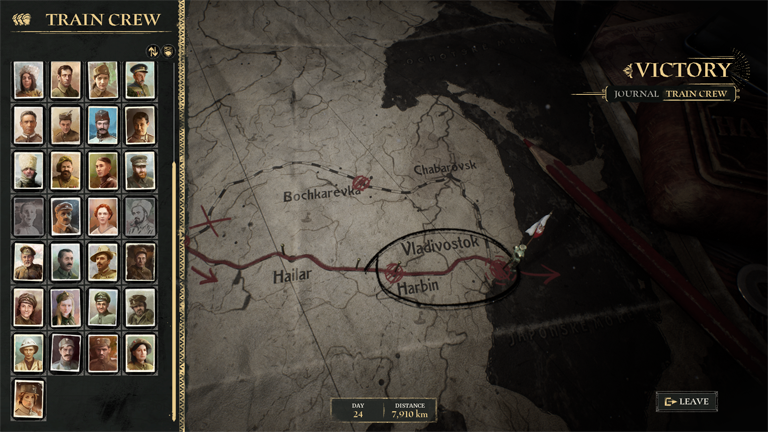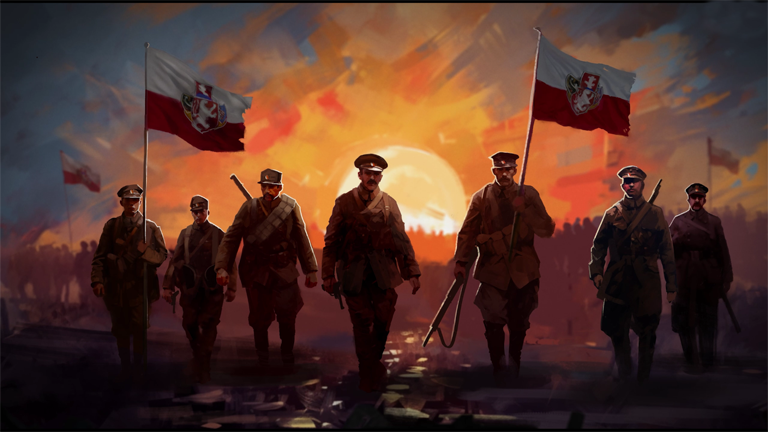Vladivostok at last
A few days ago, I finally finished my 0.00065% contribution to the evacuation of the Czechoslovak Legion from war-torn Russia by safely seeing 39 Legionnaires board a homeward-bound ship in the port city of Vladivostok. And while my initial (Google) estimate was off by about a thousand kilometers, the journey still took the better part of an in-game month (24 days) and a whopping 7,910 kilometers to complete (which, in real-world terms, translated to about 43 hours of mostly flawless game-play).

I gotta say: it feels nice not to have expectations subverted for a change. In my review, I said The Last Train Home was "one of those rare gems I can recommend without reservation" and I wholeheartedly stand by the statement. If you like historical squad-based, tactical warfare and don't mind putting up with a bit of management on the side, LTH will not leave you feeling disappointed.
On the other trotter, I also said "there wasn't a single aspect of the game that had me thinking 'eh, they could have done this better'." On that score, I was less than 100% correct — but only marginally.
The tactical missions remained brilliant throughout, gradually ramping-up difficulty, introducing new elements into the mix (like spotter aircraft you had to avoid, tanks and artillery, alarms that could upend all your careful planning, branching mission structure or even enemy troops that lost heart and retreated); constantly providing beautiful, made from scratch maps and never – ever – succumbing to lazy design or recycled ideas.
Because of the repetitious nature (and oversaturation) of combat in other games of the genre (like – let's set the bar high – X-Com), I would eventually grow to prefer the quiet, management/research lulls in between engagements. In The Last Train Home, however, the tactical segments were definitely the highlight, never leaving me with a sinking feeling of "here we go again" when it came time to assemble and equip a squad.
Not so for the management aspect of the game, however. While, for the most part, it worked fine and struck a decent balance between challenge and busy work, the – I wanna say – almost rogue-like interplay of character flaws and random situations wore a little thin by the final hours of my play-through. There simply wasn't enough variation to it, I suppose, and while being informed that a certain Legionnaire whacked his toe with an axe while cutting firewood was charming and quaint the first time it happened, having it happen Every. Single. Time. I sent said Legionnaire out to the woods grew tedious fairly quickly.
In practice, it severely limited your choice of "shore party" leaving only three or four viable (read: not resulting in axe-toe whacking) soldiers you had to use every time you needed to collect resources (or face yet another lengthy hospital car visit for the hapless logger).
Preparing more random outcomes for these little vignettes would have solved the issue, but I guess Ashborne were working to a strict schedule and couldn't spare the time.

That aside, though, while not as extensive as X-Com base-building and research, LTH's management sideline was entertaining enough and between training soldiers into capable doctors, engineers or cooks, upgrading or repairing the train cars, researching weapon upgrades or squirreling away artillery shells for the next engagement, it offered enough fun to keep you occupied between stops.
While boarding the ship in Vladivostok ended the train segment of the Legion's journey home, it was actually little more than a quarter of the distance they'd have to traverse to finally arrive in their newly founded Republic. After departing Russia, they would cross the Pacific, the width of the United States, the Atlantic and a bit of Europe to finally – finally – set foot on soil of their own...
Somewhat handily, that next leg of their journey is where The Last Train Home's DLC (the Legion Tales) picks up the story. On a lengthy train ride across the United States, a Legionnaire starts regaling a passenger with the (somewhat embellished) exploits of himself and his comrades (some of whom are sleeping next to him in the compartment).
Each "tale" is a standalone mission you undertake with a predetermined squad that has objectives to complete, which earn you points you can spend on a different (unlockable) squad for said mission. I haven't started it yet (mostly because, from Vladivostok, I boarded a different ship altogether), but it looks like a neat enough addition for anyone as enamored of the tactical segments of LTH as I was. Once I get into it, I'll append a tale of my very own...
What's with all the flying buttresses?
The ship I boarded after arriving in Vladivostok was a 1.8 kilometer long Firestorm-class frigate bound for the Koronus Expanse (which is my roundabout way of saying the Rogue Trader review is officially underway). Because I like roleplaying personalities other than my own when I play RPGs, I called the ship the Smug Bastard... Whether or not it lives up to its namesake remains to be seen, but – so far – the game, at least, is ticking all the right boxes with a good balance of exposition, skill checks and X-Com-like tactical game-play that had me up until the wee hours even though I kept meaning to stop playing and get some actual sleep.
I'll refrain from writing more for the moment (or else there'll be no point in having reviews and this whole blog'll devolve into one long rumination), but Rogue Trader makes a heartening first impression. It's very pretty, excellently acted (some of VO work is the best I've heard in a while); appropriately indepth and verbose for an RPG and offers some neat innovations (like visual customization of characters and even coop – which probably won't work without stinky Galaxy on the GoG release, but still).
While I didn't much care for Owlcat's debut release (Kingmaker had me hooked until, a couple hours in, my character failed a cooking roll which, oddly, turned me off to the whole experience); they seem to have made significant strides since and I look forward to having my first exchanges in a W40K game that don't involve actual shooting.
Pig — out.
